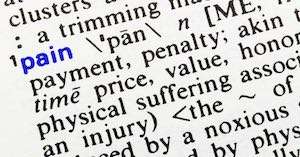
The recent opioid-prescribing guidelines from the CDC have renewed attention of health care providers to the epidemic of chronic pain, with which the opioid crisis is closely intertwined. The recommendation to move away from opioids as the first line of treating many types of chronic noncancer pain has generated an understandable outcry from some pain patients who fear that medications they need will no longer be available to them. Many people suffering from chronic pain are also expressing despair at their physicians (and the larger health care system) suddenly seeing them as part of the opioid problem and as potential addicts. These legitimate concerns have fed the hopelessness felt by many of the 50 million Americans who suffer from moderate to severe chronic pain.
Reducing opioid prescribing is not solely to address opioid misuse and overdose deaths. The rise in opioid prescribing in the late 1990s occurred despite virtually no research that had evaluated the effectiveness of these medications when administered for pain over the long term (i.e., for chronic pain). In fact, there is evidence that chronic opioid administration may worsen pain (hyperalgesia), raising the question of whether opioid overprescribing could have contributed to the increases in the prevalence of chronic pain in our country (something future research will need to address). But obviously, reducing the reliance on opioids for the management of chronic noncancer pain does not mean that we can just walk away from the pain problem. It is urgent that we find new solutions and make better use of other treatments in our existing toolkit.
Thus far, psychiatrists have not taken an active role in addressing the problem of chronic pain, but they have an important role to play here, for multiple reasons. First, cognitive-behavioral therapy is one of the most effective pain treatments; assisting patients in learning to change their pain-related thoughts, emotions, and behaviors is going to help with their condition, regardless of other pharmacological interventions. It is also necessary for psychiatrists to become involved in pain because chronic pain is closely linked to multiple psychiatric problems. For example, with chronic pain comes a high risk for suicide and depression. Pain also impacts sleep, which independently can be a factor in mental (as well as physical) health. And these psychiatric conditions bear on the effectiveness of adjunctive pain therapies such as exercise and meditation, which may be difficult to implement when a person is also suffering from depression, for example.
Addiction researchers also need to be more attentive to pain, going forward. The need for trials of non-opioid treatments is obvious and includes studies of compounds targeting the endocannabinoid system, a promising avenue for new medication development. Similarly, the use of repeated transcranial magnetic stimulation (rTMS), which is approved for the treatment of depression, has been shown in preliminary trials to be helpful in managing pain. And even in clinical trials looking at treatments for other conditions, researchers should be measuring pain to find out the extent to which it factors into how well the treatment works. For instance, the prevalence of pain is higher in people suffering from substance use disorders, but most studies don’t measure it; pain might be one of the confounders making it difficult to treat addiction. The same could be true for other psychiatric conditions.
It is crucial that we not lose sight of the reality and complexity of chronic pain as management of chronic noncancer pain moves toward greater caution around opioid medication. This should not be solely an issue for primary care medicine or neurology, but also for specialties such as psychiatry that have much to offer people who are suffering from complex disorders in which physical symptoms merge with psychological distress.
